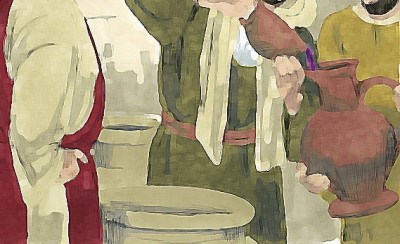Message for 2nd Sunday After The Epiphany
Brothers and Sisters,
John begins his Gospel with the famous prologue, the appearance of the Baptist, and the calling of Jesus’ first disciples.
His baptism is not actually related by the evangelist, but rather told in third person by the Baptist. The calling of the first disciples is narrated and in much more detail. The miracle at Cana is Jesus’ first public event at which something miraculous occurs. John even points out to his reader the significance of the miracle.
Cana is not in Judea. It is in Galilee. Galilee was known for its thieves, rebels, and Gentiles. Herod the Great had to clear the area of brigands twice in his life. It was in Gentile territory that Jesus made his adult home and performed his first miracle in the Gospel of John. From the very beginning therefore, Jesus is portrayed as a trans-national figure in the Gospel. His life and work go beyond the boundaries of race and nation.
This is a private miracle, subdued and quiet. It is not some flashy show of divine power. Only a few people, including the reader, know what actually happened. Jesus was even reluctant to do anything at the event. It was not meant to happen, but the persistence of his mother led him to perform what has become one of the most famous of his miracles.
The hosts ran out of wine. The wedding celebration would have ended if there was nothing to drink. Mary mentions this to her son and he replies with a sentence that has puzzled scholars. Is it a rebuke? Is it a mild objection? Is Jesus being rude? If so, his mother doesn’t seem perturbed by it and tells the servants to do whatever he tells them. She was always a woman of faith who believed in her son.
Jesus’ hour had not yet come. His hour refers to his death, resurrection, and ascension in the Gospel of John. It was too soon for wondrous events in Jesus’ ministry. Yet, he still performs a rather large miracle. The stone jars at the wedding would have been huge containers capable of holding eighteen to twenty gallons of water each. There were six of them. Not only was there enough wine for the whole village now, it was better than what had first been served.
This quiet miracle is the manifestation of Christ’s glory. But no one actually saw it. Nor was there a thunder clap to herald the event. God’s glory is not what humans expect it to be. His glory is not for mere display, but has the purpose to fulfill his service to his creation.
In Christ, the very nature of glory is being redefined. It is glory with a silent purpose and aim, to create and maintain faith in Christ Jesus who responds to human need in ways that seem hidden and mysterious, but whose deeds are open to the eyes of faith.
https://www.epiphany-2/commentary-on-John-2:1-11

